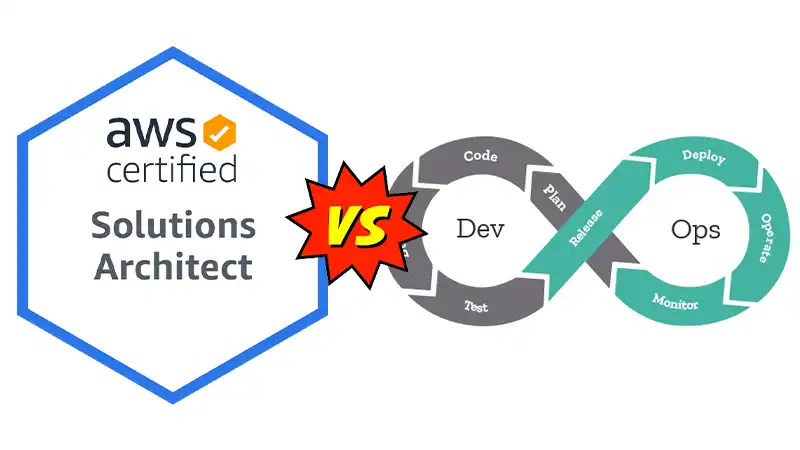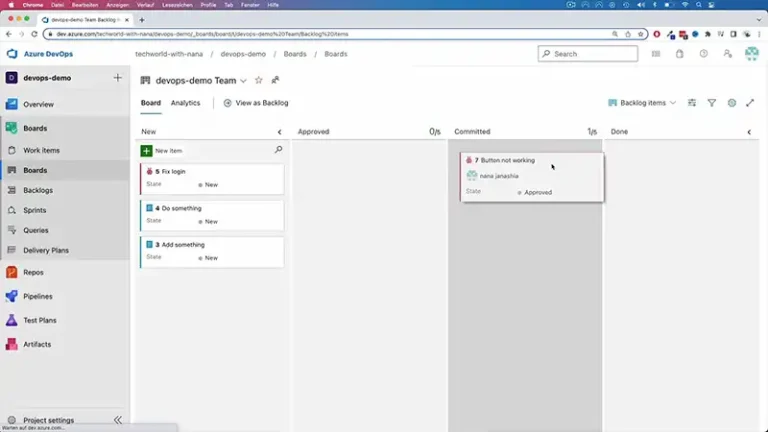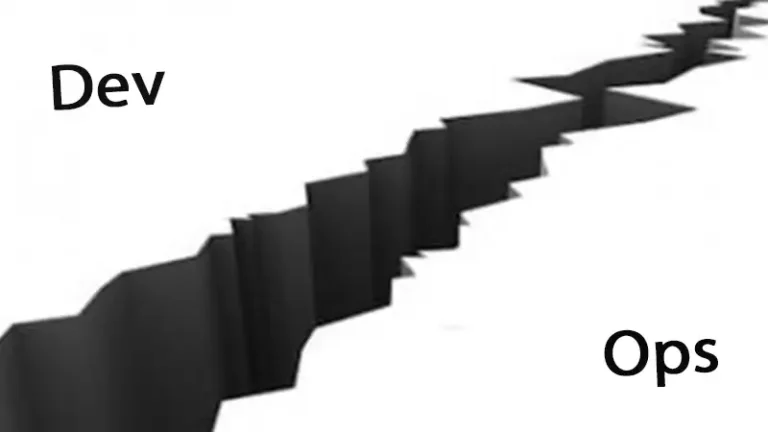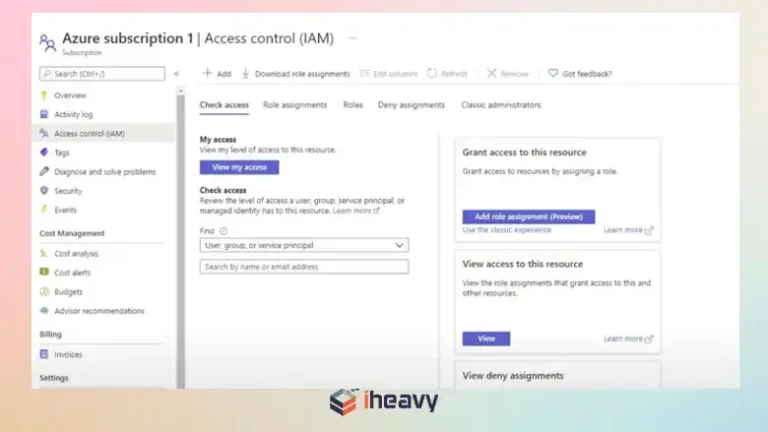Aws Solutions Architect Vs DevOps Engineer || Why they are not the same?
Both roles of Aws Solutions Architect and DevOps Engineer are crucial in modern tech environments, with Solutions Architects focusing on designing robust cloud solutions and DevOps Engineers ensuring efficient software development and deployment processes. Their collaboration often results in optimized, scalable, and reliable systems deployed on cloud platforms like AWS.
Let’s find out tasks of each and their key differences.

AWS Solutions Architect
An AWS Solutions Architect is a professional responsible for designing and deploying scalable, cost-effective, and resilient systems on the Amazon Web Services (AWS) cloud platform. Their primary role revolves around the following:
1. Architectural Design
They design and create high-level architecture for applications and systems on AWS, considering factors like scalability, reliability, performance, and security.
2. Solution Implementation
They implement the designed architecture, often collaborating with development teams to ensure proper execution of the planned infrastructure.
3. Consultation and Guidance
Guiding teams and stakeholders on best practices, cost optimization strategies, and the utilization of AWS services to meet specific business objectives.
4. Risk Assessment and Security
Assessing potential risks and implementing robust security measures to safeguard applications and data stored on the AWS platform.
5. Optimization and Cost Management
Continuously optimizing AWS infrastructure to enhance performance and cost efficiency, ensuring that resources are used effectively.
6. Technical expertise
Staying updated with the latest AWS services, tools, and industry trends to recommend and implement innovative solutions.
A DevOps Engineer
A DevOps Engineer is a professional responsible for combining development and operations practices to streamline software development and deployment processes. Key responsibilities include:
- Automation and Tooling
Developing and implementing automation tools and frameworks to facilitate continuous integration, continuous deployment (CI/CD), and infrastructure as code (IaC) practices.
- Collaboration
Bridging the gap between development, operations, and other cross-functional teams to ensure smooth communication and collaboration throughout the software development lifecycle.
- Infrastructure Management
Managing and maintaining infrastructure components, including servers, networks, and databases, often leveraging cloud services like AWS, Azure, or GCP.
- Continuous Integration/Continuous Deployment (CI/CD)
Establishing and maintaining CI/CD pipelines to automate building, testing, and deployment processes, ensuring rapid and reliable software delivery.
- Monitoring and Performance
Implementing monitoring tools and practices to track system performance, identify issues, and optimize system reliability and scalability.
- Security and Compliance
Integrating security practices into the development process, ensuring adherence to security standards and compliance requirements..
Key Differences Between AWS Solutions Architect and DevOps Engineer
- Focus Area
Solutions Architects focus on designing cloud architectures and solutions on AWS, whereas DevOps Engineers concentrate on improving development and deployment processes.
- Responsibilities
Solutions Architects design systems while considering scalability, reliability, and security, whereas DevOps Engineers optimize development workflows and automate deployment pipelines.
- Skill Set
Solutions Architects need deep knowledge of AWS services and architectural design principles, while DevOps Engineers require skills in automation, CI/CD, scripting, and infrastructure management.
- Objectives
Solutions Architects aim to create scalable and secure cloud solutions, while DevOps Engineers aim to enhance collaboration, automate processes, and improve software delivery efficiency.
Key Differences Between AWS Solutions Architect and DevOps Engineer
- Focus Area
Solutions Architects focus on designing cloud architectures and solutions on AWS, whereas DevOps Engineers concentrate on improving development and deployment processes.
- Responsibilities
Solutions Architects design systems while considering scalability, reliability, and security, whereas DevOps Engineers optimize development workflows and automate deployment pipelines.
- Skill Set
Solutions Architects need deep knowledge of AWS services and architectural design principles, while DevOps Engineers require skills in automation, CI/CD, scripting, and infrastructure management.
- Objectives
Solutions Architects aim to create scalable and secure cloud solutions, while DevOps Engineers aim to enhance collaboration, automate processes, and improve software delivery efficiency.
- Collaboration and Communication:
Solutions Architects: Collaborate closely with stakeholders, including business owners, to understand requirements and design solutions.
DevOps Engineers: Foster collaboration between development and operations teams, emphasizing effective communication to streamline workflows.
- Automation:
Solutions Architects: May use automation but primarily focus on architectural design aspects.
DevOps Engineers: Heavily emphasize automation for continuous integration, continuous deployment, and infrastructure provisioning.
- Monitoring and Performance Optimization:
Solutions Architects: Consider system performance and scalability during design but may not be extensively involved in ongoing monitoring.
DevOps Engineers: Implement monitoring tools and continuously optimize system performance as part of the CI/CD pipeline.
- Tools and Technologies:
Solutions Architects: Work with AWS-specific tools and services for architectural design.
DevOps Engineers: Use a broad range of tools, including CI/CD tools (e.g., Jenkins), configuration management tools (e.g., Ansible), and containerization tools (e.g., Docker, Kubernetes).
| Aspect | Solutions Architect | DevOps Engineer |
| Focus Area | Designing cloud architectures and solutions on AWS. | Improving development and deployment processes. |
| Responsibilities | Designing systems with scalability and security. | Optimizing development workflows, automating deployment pipelines. |
| Skill Set | Deep knowledge of AWS services, architectural design principles. | Automation, CI/CD, scripting, infrastructure management. |
| Objectives | Create scalable and secure cloud solutions. | Enhance collaboration, automate processes, improve software delivery efficiency. |
| Collaboration | Collaborate with stakeholders for solution design. | Foster collaboration between development and operations teams. |
| Automation Emphasis | May use automation but focuses on architectural design. | Heavily emphasizes automation for CI/CD, infrastructure provisioning. |
| Monitoring and Optimization | Consider system performance during design. | Implement monitoring tools, optimize performance as part of CI/CD. |
| Tools and Technologies | Primarily AWS-specific tools and services. | Broad range of tools (Jenkins, Ansible, Docker, Kubernetes). |
Frequently Asked Questions
1. What Sets An AWS Solutions Architect From A DevOps Engineer?
Answer: Solutions Architects focus on designing cloud solutions, emphasizing scalability and security. DevOps Engineers streamline development and deployment processes through automation and collaboration.
2. What Skills Differentiate These Roles?
Answer: Solutions Architects need deep AWS knowledge and design expertise, while DevOps Engineers require automation, CI/CD, and infrastructure management skills.
3. How Do they contribute to an organization’s success?
Answer: Solutions Architects create scalable, secure cloud solutions, while DevOps Engineers enhance collaboration and automate processes, resulting in efficient software delivery.
Conclusion
AWS Architects design safe cloud stuff, focusing on what a business needs. DevOps folks then make these designs real by using smart tricks to build, work together, and make tech stuff run better. Both are crucial pals, making sure companies have strong and fast tech setups that help them do cool stuff and succeed in today’s fast tech world.






